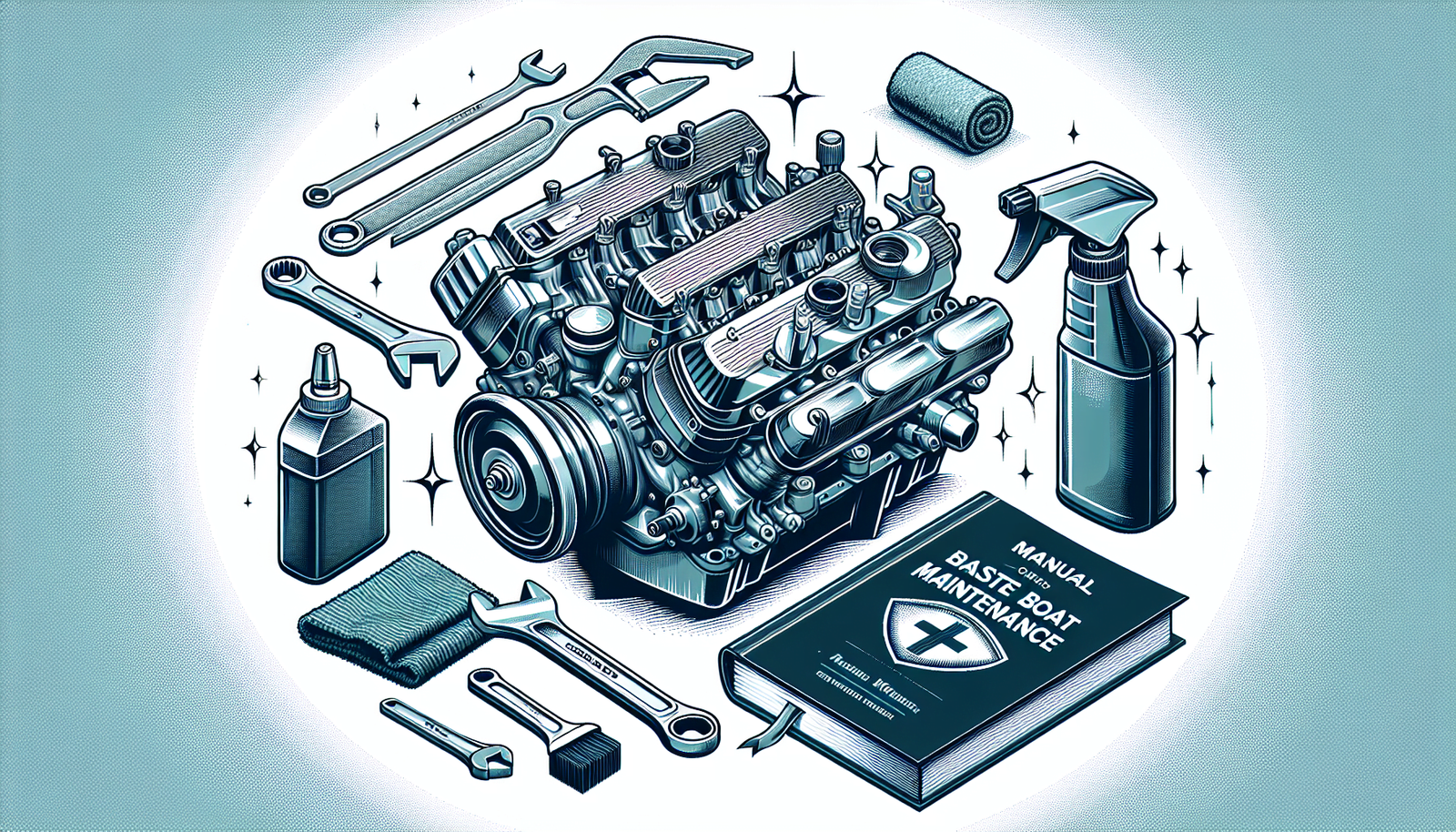If you’re a passionate sailor, there’s no denying that keeping your boat in good shape is essential. Yet, the cost of engine maintenance could take a toll on your pocket. Fear not, because “Top Ways To Save Money On Boat Engine Maintenance” is here to ease the burden. This handy guide explores numerous ways to minimize your boat engine maintenance costs while ensuring its optimal performance. You are about to discover the secret to more savings, less expense, and a well-functioning boat engine. So get ready to set sail worry-free and let your adventure begin!
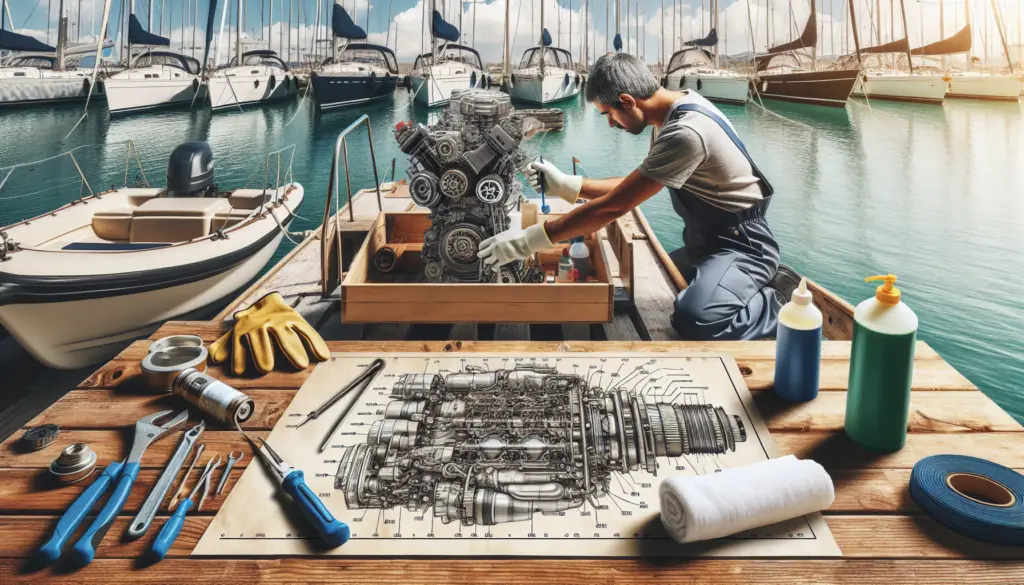
Understanding Your Boat Engine
To maximize the lifespan of your boat engine and avoid unnecessary expenses, it’s critical that you first have a solid understanding of how it operates. This knowledge not only helps in identifying issues but also aids in carrying out regular maintenance effectively. Besides, it improves your confidence and independence as a boat owner.
Knowing the basics of boat engine
Boat engines, like car engines, are complex pieces of machinery. In the simplest terms, a boat engine works by converting fuel into motion, allowing your boat to move through the water. There are two main types of boat engines: inboard engines which are built inside the boat, and outboard engines that are attached to the outside. It is essential to know the basics such as the type of engine your boat uses, its components, and how it operates.
Understanding the function of each part in a boat engine
Every part of a boat engine plays a critical role in its operation. Key components include the cylinder where fuel burning happens, the spark plugs for igniting the fuel, the pistons for converting the fuel’s energy into mechanical motion, and the propellers for turning that mechanical motion into movement through the water. Knowing the functions of these parts helps you stay aware of any changes or signs of wear that need attention.
Learning common issues of boat engines
Some common issues that boat engines face include overheating, engine not starting, and loss of power. Overheating can be caused by a broken water pump or clogged cooling system. Failure to start can result from a faulty battery or starter motor. Power loss may be due to old spark plugs or a clogged carburetor. By learning about these issues, you can know what to look for and address problems before they escalate.
Performing Regular Checks
Regular checks should be an integral part of your boat engine’s maintenance schedule. They help to uncover potential issues before they become serious and costly problems.
Benefits of regular check-ups for boat engines
Regular check-ups help to extend the lifespan of your boat engine. They allow for early detection of issues, timely maintenance, and prevent unnecessary wear and tear. The result is a boat engine that runs more efficiently and requires less costly repairs over time.
Essential parts to inspect during regular checks
Key components to inspect during regular checks include the propellers, fuel system, cooling system, oil levels, and exhaust system. It’s also crucial to check the engine’s overall cleanliness as dirt and debris can cause damage. Regularly checking these parts helps you keep the engine in top shape and improve its longevity.
How often should you perform boat engine checks
Regular engine checks should ideally be performed once every month or after every 20 hours of operation. The frequency may also depend on the boat’s usage and the manufacturer’s guidelines. Always ensure to document each check-up session for reference and in case of warranty claims.
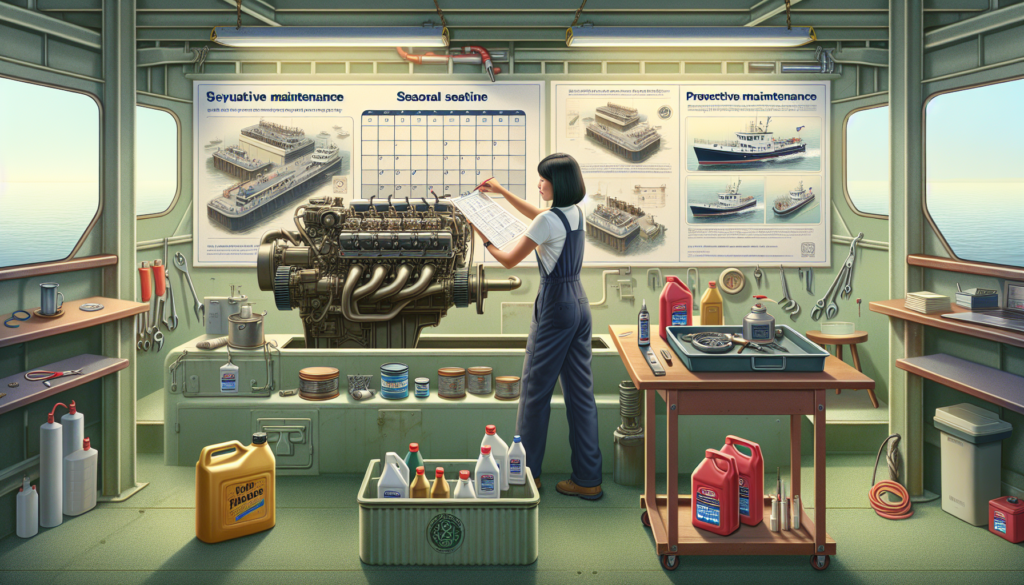
Doing Routine Oil Changes
regular oil changes are a vital part of maintaining a healthy boat engine. The engine’s oil lubricates the moving parts, reducing friction and the possibility of overheating.
Importance of regular oil changes
Regular oil changes help to keep your boat engine running smoothly and efficiently. They help to prevent wear and tear on the engine parts, improve fuel efficiency, and extend the life of your engine.
The right time to change boat engine oil
The frequency of oil changes depends on the type of engine, its age, and how frequently the boat is used. However, a good rule of thumb is to change the engine oil every 50-100 hours of operation or at least once a year.
Choosing the right oil for your boat engine
Using the right oil for your boat engine is crucial. The type of oil needed varies depending on the type of engine, its age, and the environmental conditions under which the boat operates. Always refer to the manufacturer’s recommendations when choosing the right oil for your engine.
Maintaining the Cooling System
the cooling system plays a critical role in preventing your boat engine from overheating. Proper care and attention to the cooling system can prevent major damage and expensive repairs.
Significance of a functional cooling system
A working cooling system ensures the engine maintains an optimum temperature, prevents overheating, and supports the overall performance of the boat. Regular maintenance of the cooling system is thus vital in the longevity of your boat engine.
Cleaning and inspecting the cooling system
Regular cleaning and checking of the cooling system are critical in preventing clogs and leakages. This involves inspecting the coolant level, condition, and checking for leaks. Always ensure the marine coolant is within the manufacturer’s recommended levels.
Replacing parts of a cooling system when necessary
Certain parts of a boat’s cooling system will need replacement eventually. This includes components like the water pump, coolant, and thermostat. Replacing these parts as per the manufacturer’s recommendations or when they show signs of wear will help to prevent costly repairs in the future.
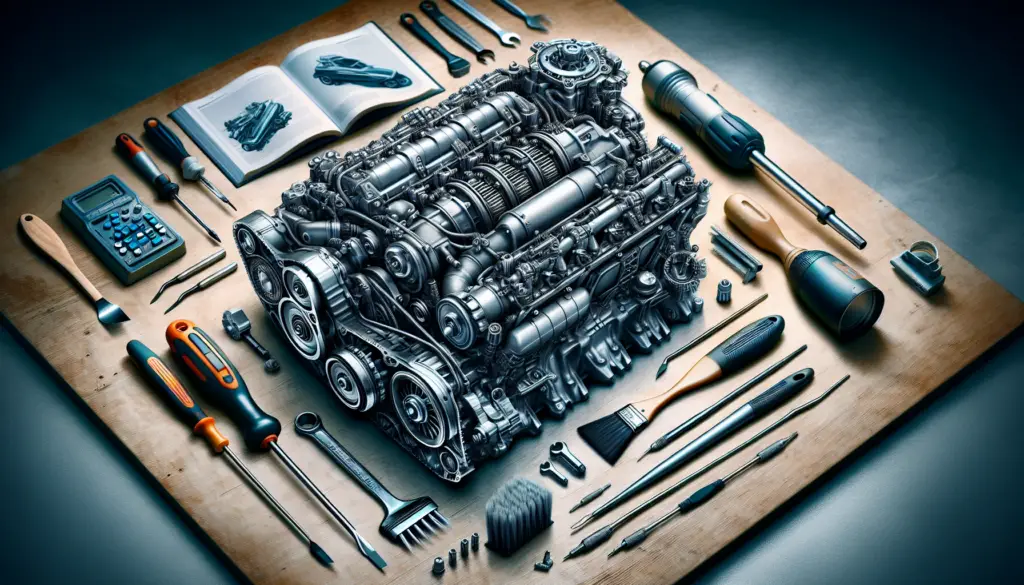
Regularly Cleaning and Inspecting the Fuel System
A clean fuel system leads to a well-performing engine. Regularly cleaning and inspecting the fuel system can save you from potential engine issues and costly repairs.
Impact of a clean fuel system on a boat engine’s performance
A clean fuel system ensures uninterrupted and efficient fuel delivery to the engine, translating to optimal engine performance. Dirty or clogged fuel systems can cause problems such as engine stalling, poor fuel economy, and loss of engine power.
Steps on cleaning and inspecting your fuel system
Regular inspection of the fuel system involves checking the fuel lines for any signs of cracking or damage, cleaning or replacing fuel filters, checking fuel levels, and the fuel tank for signs of rust or other contaminants. This routine keeps the engine running smoothly and efficiently.
Tips on preventing fuel system issues
To prevent fuel system issues, always ensure you use fresh, high-quality fuel. Keep the fuel tank full when in storage to prevent condensation. Also, regularly clean and replace the fuel filters as they play a key role in keeping your fuel pure.
Keeping the Electrical System in Top Shape
The electrical system is vital for starting the boat engine, charging the battery, and powering all electrical features in the boat. Therefore, ensuring your boat’s electrical system stays in top shape is crucial.
Roles of the electrical system in a boat engine
The electrical system powers the ignition system, engine’s control unit, fuel system, and other electrics such as the lights and radio. Any issues with the electrical system can affect these functions and lead to significant performance issues or even an engine failure.
Routine inspection for the electrical system
Maintaining the electrical system involves routine checks of the battery and its connections, alternator, and the condition of all wires. A good practice is to look for signs of wear such as frayed wires, inspect the tightness of connections and regularly clean battery terminals to prevent corrosion.
Addressing common electrical system problems
common electrical system issues include battery problems, issues with the alternator, corroded connections, and worn-out spark plugs. These issues can often be fixed by replacing the faulty parts.
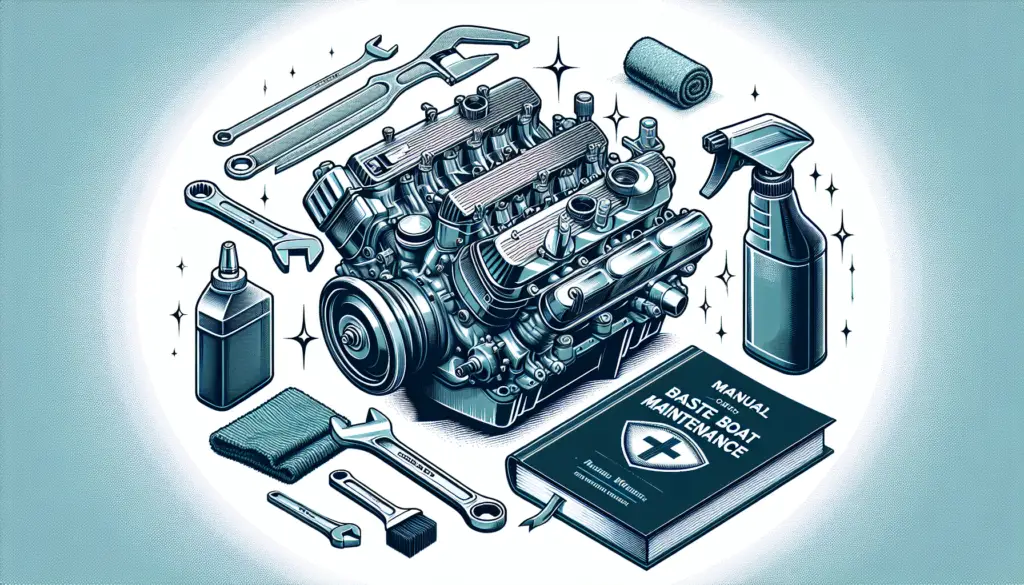
Boat Engine Storage and Seasonal Maintenance
how you store your boat’s engine during off-seasons and the maintenance performed can impact its longevity and reliability. Proper preservation methods can prevent unnecessary damage and expensive repairs.
Correct ways to store a boat engine during off seasons
Correct storage involves cleaning the engine thoroughly, emptying the fuel tank or adding a stabilizer, disconnecting the battery, and covering the boat to protect it from the elements. Also, consider storing it in a dry place to prevent rust and corrosion.
Proper methods of waking up a boat engine
Starting-up your boat engine after long storage requires specific steps to ensure long life and reliability. Inspect the engine for any visible damage, ensure the cooling system is filled, and check the fuel and oil levels. Turn the engine over a few times before starting it to distribute the oil and prevent dry start.
Seasonal checks and maintenance to be performed
During different seasons, your boat engine might need specific checks and maintenance practices. In summer, check the cooling system more often due to higher temperatures. In winter, focus on using proper antifreeze and check for potential freezing issues.
Learning Basic Boat Engine Repairs
Even with regular maintenance, parts can wear out, and issues can arise. knowing basic boat engine repairs can save you time and money.
Basic repair skills every boat owner should know
Basic repair skills include changing oil, replacing spark plugs, cleaning or replacing fuel and air filters, and changing the propeller. These are simple tasks that can be done without professional help.
When to DIY and when to call for professional help
While you can handle basic maintenance and minor problems, more severe issues like significant engine damage, electrical system rewiring, or fuel system overhauls require professional assistance. It’s essential to know when to DIY and when to call a professional.
Equipment needed for basic boat engine repairs
The basic tools needed for engine repairs include a wrench set, screwdrivers, pliers, and a socket set. Additionally, having a multimeter can help diagnose electrical problems.
Choosing Quality but Affordable Spare Parts
Keeping your boat engine running smoothly sometimes entails replacing worn-out or damaged parts. However, it is crucial to strike a balance between getting quality parts and avoiding unnecessary costs.
Finding the right spare parts for your boat engine
Finding the right spare parts for your boat engine begins with identifying the make and model of your engine then sourcing parts from reputable suppliers. Ensure the parts match the specifications given by the manufacturer.
Balancing quality and affordability when buying parts
While it can be tempting to opt for the cheapest parts, it is vital to consider quality, as inferior parts might fail faster and lead to more significant issues. Try to balance the cost with the reliability and durability of the parts.
When and where to buy spare parts
It’s advisable to buy spare parts when they’re needed to avoid the risk of them becoming obsolete. You can purchase them from boat shows, dealerships, or reputable online stores. Always consider the warranties given on parts to assure their quality and reliability.
Making the Most of Your Boat Engine’s Warranty
Warranties provide security against unforeseen malfunctions within a specific period. Making the most of your boat engine’s warranty ensures you save on potential repair costs.
Understanding what is covered in the warranty
Reading and understanding your boat engine warranty is crucial. It outlines what is covered, the period during which the coverage is valid, and the actions that could potentially void the warranty.
Claiming the warranty
Claiming a warranty when necessary is as essential as understanding it. Keep track of all maintenance and repair records as these can serve as proof when making a claim.
Extent and limitations of boat engine warranties
While warranties are beneficial, they have their limitations. Often, they cover specific parts or defects, and the coverage tends to diminish as the warranty period progresses. Regular maintenance and following the manufacturer’s guidelines will help to ensure the validity of the warranty.

